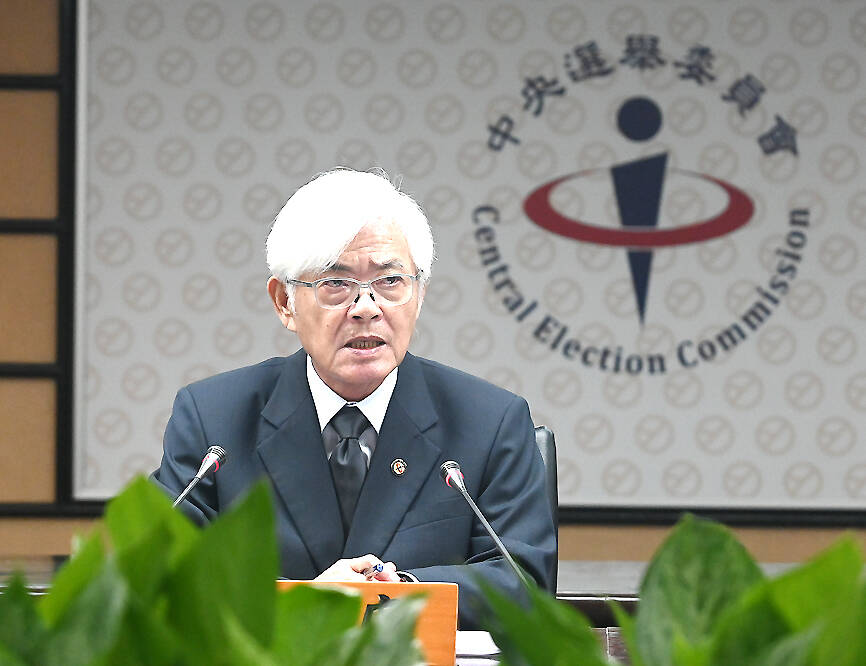Ten 10 independent tickets have been registered for petitions to become presidential and vice presidential candidates in the presidential election next year, the Central Election Commission (CEC) said.
The list unveiled by the commission on Monday shows that, apart from Hon Hai Precision Industry Co (鴻海精密) founder Terry Gou (郭台銘) and his running mate, Tammy Lai (賴佩霞), 18 other individuals, including Lan Hsin-chi (藍信祺), who is partnering with the head of the Gong He Party, Chou Ke-chi (周克琦), have registered for the signature drive.
Lan, an ex-convict who served 19 years in prison for a high-profile double homicide he committed in 1981, first registered to run for the presidency in 2011 after his release from jail, but his application was rejected. He again launched a signature drive for a presidential bid in 2015, but was unable to collect enough signatures.

Photo: Wang Yi-sung, Taipei Times
The list also includes Cheng Tzu-tsai (鄭自才), whose running mate is Huang Sheng-feng (黃聖峰). The former is an architect who became notorious after getting involved in a conspiracy in 1970 to assassinate late president Chiang Ching-kuo (蔣經國).
Under the Presidential and Vice Presidential Election and Recall Act (總統副總統選舉罷免法), the independent hopefuls must submit at least 289,667 signatures, or 1.5 percent of eligible voters in the previous presidential election, before Nov. 2 to qualify as candidates in the election on Jan. 13. They also must put up a NT$1 million (US$31,248) deposit.
The results of the petitions would be announced by Nov. 14, the CEC said.
If the number of signatures collected by an independent hopeful fails to reach half of the required number, the deposit would not be returned, but it would be handed back if at least 144,834 signatures are received.
Candidates nominated by parties or independent candidates who collect enough signatures to qualify to run are required to register from Nov. 20 to 24.
The presidential candidates nominated by the three major parties are Vice President William Lai (賴清德), who chairs the Democratic Progressive Party, New Taipei City Mayor Hou You-yi (侯友宜) of the Chinese Nationalist Party (KMT) and Taiwan People’s Party Chairman Ko Wen-je (柯文哲).
Meanwhile, the CEC said that overseas Taiwanese who want to vote in next year’s election must first register with a household registration office in Taiwan by Dec. 4, in the absence of an absentee voting system.
Overseas Taiwanese who want to vote in the election are required to register by mail with the household registration office where they last registered their address before moving abroad, CEC Chairman Lee Chin-yung (李進勇) said.
They can download and fill out the application form at https://2020.cec.gov.tw and send it to the household registration office, which would review the application and send the result back to them or to a designated person in Taiwan.
Taiwanese living abroad are eligible to vote in the presidential election if they are at least 20 years old, hold a Republic of China passport and previously had their household information registered in Taiwan for at least six months before moving overseas, CEC Vice Chairman Chen Chao-chien (陳朝建) said.

DAREDEVIL: Honnold said it had always been a dream of his to climb Taipei 101, while a Netflix producer said the skyscraper was ‘a real icon of this country’ US climber Alex Honnold yesterday took on Taiwan’s tallest building, becoming the first person to scale Taipei 101 without a rope, harness or safety net. Hundreds of spectators gathered at the base of the 101-story skyscraper to watch Honnold, 40, embark on his daredevil feat, which was also broadcast live on Netflix. Dressed in a red T-shirt and yellow custom-made climbing shoes, Honnold swiftly moved up the southeast face of the glass and steel building. At one point, he stepped onto a platform midway up to wave down at fans and onlookers who were taking photos. People watching from inside

A Vietnamese migrant worker yesterday won NT$12 million (US$379,627) on a Lunar New Year scratch card in Kaohsiung as part of Taiwan Lottery Co’s (台灣彩券) “NT$12 Million Grand Fortune” (1200萬大吉利) game. The man was the first top-prize winner of the new game launched on Jan. 6 to mark the Lunar New Year. Three Vietnamese migrant workers visited a Taiwan Lottery shop on Xinyue Street in Kaohsiung’s Gangshan District (崗山), a store representative said. The player bought multiple tickets and, after winning nothing, held the final lottery ticket in one hand and rubbed the store’s statue of the Maitreya Buddha’s belly with the other,

‘NATO-PLUS’: ‘Our strategic partners in the Indo-Pacific are facing increasing aggression by the Chinese Communist Party,’ US Representative Rob Wittman said The US House of Representatives on Monday released its version of the Consolidated Appropriations Act, which includes US$1.15 billion to support security cooperation with Taiwan. The omnibus act, covering US$1.2 trillion of spending, allocates US$1 billion for the Taiwan Security Cooperation Initiative, as well as US$150 million for the replacement of defense articles and reimbursement of defense services provided to Taiwan. The fund allocations were based on the US National Defense Authorization Act for fiscal 2026 that was passed by the US Congress last month and authorized up to US$1 billion to the US Defense Security Cooperation Agency in support of the

HIGH-TECH DEAL: Chipmakers that expand in the US would be able to import up to 2.5 times their new capacity with no extra tariffs during an approved construction period Taiwan aims to build a “democratic” high-tech supply chain with the US and form a strategic artificial intelligence (AI) partnership under the new tariffs deal it sealed with Washington last week, Taipei’s top negotiator in the talks said yesterday. US President Donald Trump has pushed Taiwan, a major producer of semiconductors which runs a large trade surplus with the US, to invest more in the US, specifically in chips that power AI. Under the terms of the long-negotiated deal, chipmakers such as Taiwan Semiconductor Manufacturing Co (TSMC, 台積電) that expand US production would incur a lower tariff on semiconductors or related manufacturing